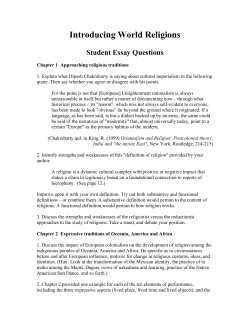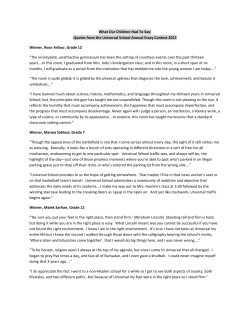
Do All Religions
Pagan & Tribal Religions. This represents an even greater diversity of religions, about 5% of the world’s population. Have they discovered the Ten Commandments? 1. No. Nearly all worship multiple gods. 2. No Nearly all use idols. 3. Maybe. With so many gods, good and bad, the issue is not clear. 4. No. The Sabbath is not taught. 5. Varies. Sometimes parental loyalty is emphasized, sometimes tribal loyalty completely exceeds it. 6. Varies. Some war-like religions look upon a man who can kill his enemies (even within the tribe) and get away with it as strong and therefore desirable. Some have official procedures for challenging another to a fight to the death. 7. Varies. Some of these religions teach monogamous marriage, others look up to those who achieve “great” sexual conquests. 8. Mostly. Many teach against stealing, but some accept that the strong will take possessions from the weak. 9. Varies. Some groups encourage honest testimony, others teach that it is all right to do whatever one can “get away with”. 10. Usually no. Many adherents see their religions as a means to get possessions, not as a way to learn to use possessions righteously. At the best, these religions may teach seven of the Ten Commandments, but usually less, and sometimes none. Secular Humanism While this is a non-religion, it represents about 10% of the world’s population and has a massive effect on policies in Western nations. There is no creed or organization, just people doing a combination of what they think is right and what seems to be popular with others. 1. No. God is a vague concept, if taught at all. 2. Yes, in a way. They would see worshiping a physical idol as silly. However, it might be argued that these people are worshipping themselves, their companies or their possessions. 3. No. “God” is a mundane, near-meaningless word to be used however one sees fit. 4. No. The Sabbath is treated like other days. 5. Varies. Some believe children should honor parents, others believe children should be raised by and loyal to the secular state. 6. Partly. Most are against killing people (even convicted murderers), but most have no trouble with killing babies before they are born. 7. No. Sex is considered an individual’s choice. 8. Partly. Taking another’s property against the state’s laws would be considered wrong, but it is acceptable to do it though the court system or a deceptive, but lawful, business deal. 9. Partly. The courts and public opinion determine whether false testimony is really wrong. 10. Usually no. The desire to have what someone else has is often taught as the motivation to work hard, though an occasional psychologist might recognize the stress from it can be bad. At the best, secular humanism may teach six of the Ten Commandments. But less than half is a lot more typical in most cases. Summary People, left to themselves, do not discover all the Ten Commandments. Religions that have God’s words on Mt. Sinai do a lot better job of teaching them than those who do not. We should be thankful for the Commandments that God has given us, and want to read the rest of the Bible that contains them. by Norman Edwards, Church Bible Teaching Ministry PO Box 107, Perry, Michigan 48872-0107; Tel: 517625-7480; e-mail: info@ShelterInTheWord.com For more information and/or help with your own Bible study, please contact: ALLTEN01 Do All Religions Teach the Ten Commandments? Are all religions basically alike? Do they all have something like the Ten Commandments at their core? To answer briefly, “No!” People with no religion, people who participate in numerous religions, and especially those who are trying to unite all religions sometimes like to claim that all religions have the Ten Commandments as a common basis. Let us briefly examine the Ten Commandments and what various religions teach. How well various religions actually practice those Commandments is probably a much more important issue, but it is much more difficult to prove. This tract will primarily stick to what is officially taught. Much information about various world religions is available at www.adherents.com and other sites to which it links. What Are the Ten Commandments? The Ten Commandments can be found in Exodus 20 and Numbers 5. From Exodus 20, they are: 1. I am the LORD your God, who brought you out of Egypt, out of the land of slavery. You shall have no other gods before me. 2. You shall not make for yourself an idol in the form of anything in heaven above or on the earth beneath or in the waters below. You shall not bow down to them or worship them; for I, the LORD your God, am a jealous God, punishing the children for the sin of the fathers to the third and fourth generation of those who hate Me, but showing love to a thousand generations of those who love Me and keep My continued inside... continued from front page… commandments. 3. You shall not misuse the name of the LORD your God, for the LORD will not hold anyone guiltless who misuses his name. 4. Remember the Sabbath day by keeping it holy. Six days you shall labor and do all your work, but the seventh day is a Sabbath to the LORD your God. On it you shall not do any work, neither you, nor your son or daughter, nor your manservant or maidservant, nor your animals, nor the alien within your gates. For in six days the LORD made the heavens and the earth, the sea, and all that is in them, but he rested on the seventh day. Therefore the LORD blessed the Sabbath day and made it holy. 5. Honor your father and your mother, so that you may live long in the land the LORD your God is giving you. 6. You shall not murder. 7. You shall not commit adultery. 8. You shall not steal. 9. You shall not give false testimony against your neighbor. 10. You shall not covet your neighbor’s house. You shall not covet your neighbor’s wife, or his manservant or maidservant, his ox or donkey, or anything that belongs to your neighbor. Christianity, Islam, Judaism Christianity, Islam and Judaism all recognize the “Old Testament” Scriptures. The Jews see these Scriptures as the revelation of God to man, and teach all Ten Commandments or “ten sayings” as the literal Hebrew calls them. They have gone as far as adding many traditions, designed as “fences” to prevent their adherents from even getting close to breaking the commandments. While these traditions have sometimes helped them keep the commandments, they have also backfired. Jesus said: “Thus you have made the commandment of God of no effect by your tradition” (Matt 15:6, NKJV). Judaism makes up well less than 1% of the world’s religions. Christians of all types make up about 33% of the world’s religions. While most regard the Old Testament as the “inspired Word of God”, Christian denominations vary as to its application today. Some teach the Ten Commandments as completely in force, others teach that it was part of the law that was “nailed to the cross”. Of those that do not teach the commandments as applicable law, it is primarily the 4th Commandment, to remember the Sabbath, that Christian denominations see as no longer in force. Other Christian groups teach all 10 and simply teach that the Sabbath has been changed to Sunday. The Roman Catholic Church, and some other older churches have renumbered the Commandments, combining 1 & 2, and splitting Commandment 10 into two Commandments. The reason appears to be to avoid having a separate commandment not to worship idols. While these churches technically claim that their many statues and images are “aids to worship” and that they are not being worshipped, many of their followers believe that there is a spiritual blessing for kissing or worshiping statues and images. Islam accounts for about 22% of the world’s population. By contrast, they have traditionally carried the Commandment against idols so far as to not have any pictures or statues of anything in their religious sites. Muslims believe much of the Old Testament, but believe it has been altered by the Jews. For example, they believe that Abraham was the father of the faithful, but that God’s promises to Abraham were to go through Ishmael, from whom the Arabs are descended, rather than Isaac, through whom the Israelites are descended. Nevertheless, they accept Moses as a teacher and acknowledge the Ten Commandments. They worship on Friday, rather than the seventh-day Sabbath, however. Moslems believe in one God who takes an active role in the actions of men—One who will reward those who do good and punish those who do evil. They believe Jesus was a good teacher, but not the son of God or our Savior. In summary, Christianity, Islam and Judaism are the big religions that accept the Old Testament in some way and teach the Ten Commandments. Hinduism and Buddhism Hinduism, Buddhism and similar religions are claimed by about 22% of the world’s population. There is more diversity in these religions than there is in Christianity, Islam or Judaism. This makes it difficult to analyze which of the commandments are taught, because one subgroup might teach a particular Commandment and another might not. We will comment on each, below. 1. No. These religions do not recognize one supreme God who both created the universe and speaks to men and deals directly in the affairs of men, such as bringing Israel out of Egypt. 2. No. Hundreds of idols are used. 3. Maybe. They teach speaking respectfully of good gods, but with so many gods, good, bad and in-between, the issue is cloudy. 4. No. The Sabbath is not taught. 5. Yes, mostly. Honor for parents is taught, although honor for religious teachers may replace it at times. 6. Yes. Avoiding murder is carried over to the animal world—many adherents will go to great pains to avoid killing animals, even though people are hungry. 7. Partly. Some branches of these religions teach that sex is only for within marriage, but others accept a variety of sexual experiences as long as they do not appear to hurt others. 8. Mostly. Taking something from someone else is considered wrong, but Hinduism accepts the caste system—which finds no difficulty with one group of people unable to own property and therefore laboring their whole lives to serve a wealthy caste. 9. Mostly. While most common people would see lying as wrong, religious texts can ramble on for pages about exactly when it is O.K. to shade or alter the truth in a certain way. 10. Yes. These Eastern religions are usually quite good at teaching people to be content with what they have. These religions teach a little better than half of the Ten Commandments—not all by any means.
© Copyright 2025

















